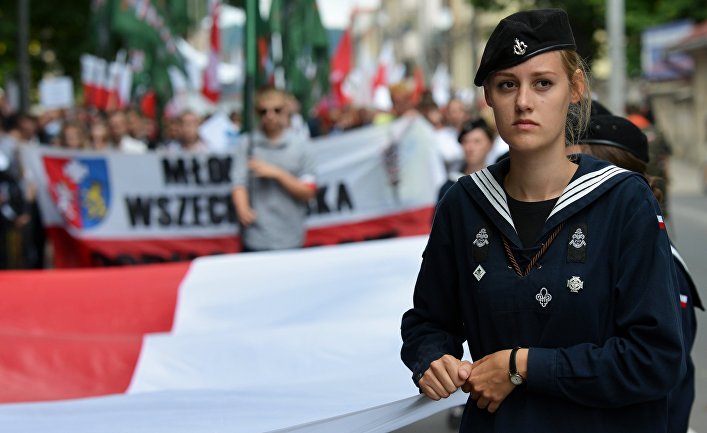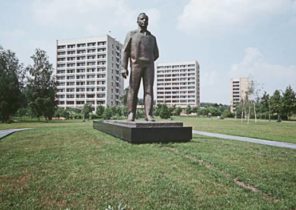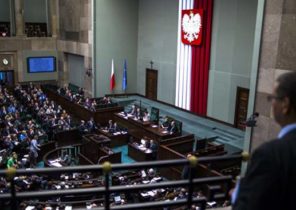
The widespread belief in diplomatic circles of the European Union is: why ask Warsaw about Ukrainian Affairs, if she will say the same thing that Kiev? Indeed, after the fall of the iron curtain Poland is a traditionally Pro-Ukrainian position. She was the first to recognize the independence of Ukraine, and then, whoever was in power, supported the European aspirations of the country, the Orange revolution and Euromaidan. Thus, a growing Polish-Ukrainian contradictions, which are aggravated on the background of the premiere of the film “Volyn” directed by Wojciech Smarzowski, in English called “Hatred” were a surprise.
As often happens in this region, controversial topic relates to historical memory. The film is about the love Polish girls and Ukrainian boys in the shadow of the Volyn massacre — the mass murder of poles by Ukrainian nationalists and smaller-scale responses and action of poles in 1943 and 1944, under the German occupation. The Director tried to show the nuances. The film is “good” Ukrainians and “bad” poles and also shows the mixed identity of the inhabitants of the territory. However, he makes a small emphasis on the factors that led to the tragedy, and this has led some critics to say that the film glorifies martyrdom with typical Polish point of view.
Contradictions
The film attracted criticisms, mainly from Ukraine, though few critics were able to see it. The show in Kiev was canceled by the Ministry of foreign Affairs of Ukraine because of “fears for the safety of spectators” (a few months earlier in Poland under the same pretext was canceled a concert of Ukrainian group “ot Vinta”). Refusing to tell journalists screening copies, as is customary in Poland, the distributor has not alleviated the situation. We can only guess what relationship it had to the need “to restrain Pro-Russian journalists,” as explained by the distributors. Oddly enough, the strategy proved to be very effective, and in the illegal distribution of the film is also impossible to find.
The appeal of the film for the Russian propaganda machine has become one of the main accusations by the Ukrainians. Film showing Ukrainians bloodthirsty fascists, definitely will support the point of view of Moscow on the current conflict and reinforce coarse stereotypes that can be found in the European media. On the other hand, as said Smarzowski for showing the film “never the time”.
Contradictions are also associated with the historical inaccuracies shown in the film (in one scene, a Greek-Catholic priest blesses the murder weapon), and also because it enhances Polish stereotypes about Ukrainians, about how cruel peasants sadists. In “Volyn” it is easy to find the Polish post-colonial fantasies of Crecy — historical view of the Eastern regions of the Commonwealth, as a multicultural, supposedly, idyllic space, after 1945, included into the USSR. For Ukrainians Kresy is a Polish story of colonialism, centuries of discrimination along ethnic and class lines (all Ukrainians were peasants, ruled by the Polish or Polonized nobility), and after the XIX century — the history of the interference of the national movements and movements for the rights of minorities. These side storylines only occasionally mentioned, but with the same success it was possible to miss.
The Polish premiere of “Volyn” also caused a huge debate. Conservative critics sympathetic to the ruling party “law and justice” (Pis) met the painting with enthusiasm. To give importance to topics such as the Volyn massacre, corresponds to the far-right interpretation of Polish history as martyrdom and sacrifice. Pro-Ukrainian right-wing has said, quite rightly, that mutual understanding requires to discuss even the most difficult questions. But for the extreme right Volyn massacre is evidence of “eternal enmity” between poles and Ukrainians. Unfortunately, these voices have contributed to the increasing xenophobic attitude of the poles to the growing Ukrainian Diaspora.
The bridge to reconciliation?
It should be noted that Wojciech Smarzowski and his crew can hardly be suspected of nationalist sympathies. Smarzowski is one of the most interesting contemporary Polish Directors. He fiercely criticizes the Polish bigotry, greed, and dishonesty. He makes films with social criticism and is considered a star of the liberal media. For this reason, the support given to his film Pro-government circles, was unexpected.
The Director called his film the bridge leading to reconciliation. But the audience, weary of bloodshed, hardly believe it. The Director also stated publicly that he opposes the use of film for political purposes. So he refuses to accept a large cash award from Jacek Kurski (Jacek Kurski), Director of the government-controlled public television. Left and liberal circles in Poland to a certain extent the objections of the Ukrainians. Moreover, they note that in the fight against the dark pages of history, the poles should start with yourself. Discrimination and numerous atrocities against the national minorities were among the topics of Polish pupils in schools practically do not pass. At the same time, for historical events that are impossible to hide (for example, an anti-Semitic campaign in 1968), poles blamed solely on the Communist government. Public debate through the dark aspects of Polish history began in the beginning of the decade, unlikely to be continued in the existing political climate.
Interestingly, some critics believe “Volyn” is not anti-Ukrainian film, and anti-nationalist, and called a tribute to the victims of the bloodshed in Eastern Europe. In addition to the massacre, the film also shows — in the background — revenge of the poles, the Ukrainians, the German hunt for Jews and the brutality of the red Army. It should also be noted that the main heroine of the film, overly kind, adheres to a mixed Polish-Ukrainian identity. Its absolutely not interested in the nationality of the unfortunate, whom it helps — Jews, poles, Ukrainians.
Smarzowski known to the Polish audience as a Director, removing the banality of evil Hannah Arendt cruelly. Although most of his films are deeply rooted in the Polish context, they can be considered a universal portraits of people caught up in moral day, stories of unjustifiable evil. In the case of “Volyn” Smarzowski tried to add details, so as not to allow the use of film as anti-Ukrainian instrument. But, as we see, anyone can use the film for their own purposes.
The two sides
For the debate surrounding the film the painting itself is only a means. The main theme of Polish-Ukrainian relations, and they are much worse. Although at the level of declarations of IPRs, the government remains Pro-Ukrainian, it does little in support of Ukraine. And for Ukraine the Polish government with its growing conflict with the European Union too is losing its status of a reliable partner. The main reason for the differences is the attitude to the Ukrainian insurgent army (UPA). From the Polish point of view Ian first collaborated with Hitler and were responsible for the Volyn massacre. From the Ukrainian point of view, they were rebels who fought for the liberation of Ukraine from Soviet and Polish authorities, the heroes have become an example for the Ukrainian soldiers today fighting in the East of the country. Both sides refuse to acknowledge another point of view.
However common in Poland, the view that Volyn — forbidden in Ukraine subject, wrong. This question is researched by Ukrainian historians, and at the bilateral level, there were some symbolic gestures, for example, in 2016 the President of Ukraine honored the memory of the victims. However, the General level of knowledge about the Volyn massacre is limited, and it is associated mainly with the consequences of the Soviet attitude to history.
Unfortunately, it seems that “Volhynia” will be mostly fuel for xenophobic attitude to Ukrainians, previously marginal, but now splashed out on street. At the same time, it is difficult to expect that the poles who had heard of the Volyn massacre of their relatives during the Communist regime will ignore the glorification of the UPA in the Ukrainian interpretation of history. For Ukrainians, unfortunately, now is not the right time for reconciliation with the errors of the past, and it is unlikely a time will come in the foreseeable future. Moreover, poles still haven’t proven that they can be role models in this area.






